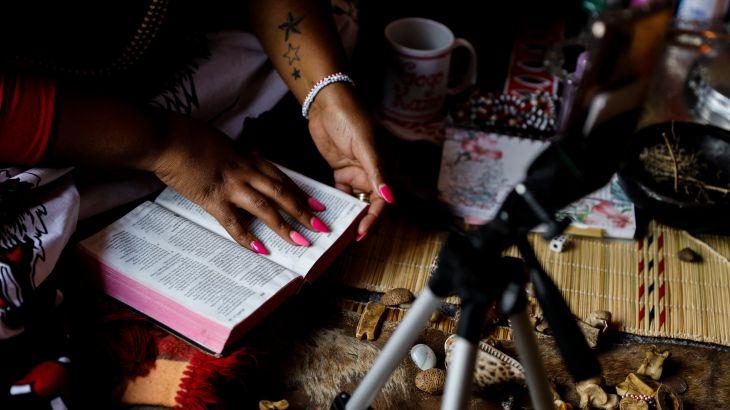Zimbabwean traditional healers embrace social media platforms like TikTok to connect with clients and offer spiritual guidance, sparking debate on the fusion of technology and African spirituality.
Harare, Zimbabwe – Wearing a fashionable black leather jacket and a red blouse, topped with a denim sun hat covering her dreadlocks, Gogo Mafirakureva goes live on TikTok. In the early minutes of her livestream, she attracts nearly 1,000 viewers.
A traditional song fills the air as she adorns colorful beads and indulges in tobacco snuff, a common practice among Southern African traditional healers. As viewers engage with her, seeking spiritual guidance and solutions, Mafirakureva, a sangoma, patiently awaits her late great-grandfather's spirit to communicate with her.
Sangomas, like Mafirakureva, act as intermediaries between the physical and spiritual worlds, connecting with ancestors or deities to provide healing and guidance. With rhythmic rituals like drumming and chanting, they enter trance-like states to channel messages and offer remedies.
In a digital shift, a new wave of younger sangomas, such as Mafirakureva, has embraced social media platforms like TikTok to engage with a global audience, providing advice and consultations online.
At the heart of traditional healing practices for centuries, sangomas have played a vital role in communities, addressing physical and spiritual ailments. Offering a mix of in-person consultations and virtual sessions, healers adapt to modern technologies while preserving ancient healing traditions.
Despite gaining popularity on social media, some critics question the authenticity and motives of these "social media sangomas," accusing them of commercializing sacred practices for profit. Meanwhile, proponents view this digital evolution as a modern way of making traditions accessible beyond physical barriers.
As technology and spirituality converge, debates arise over the compatibility of ancient beliefs with contemporary platforms. For some, it represents innovation and accessibility, while others raise concerns about ethics and authenticity in the digital age.
Source: ALJAZEERA
ALJAZEERA MEDIA NETWORK
